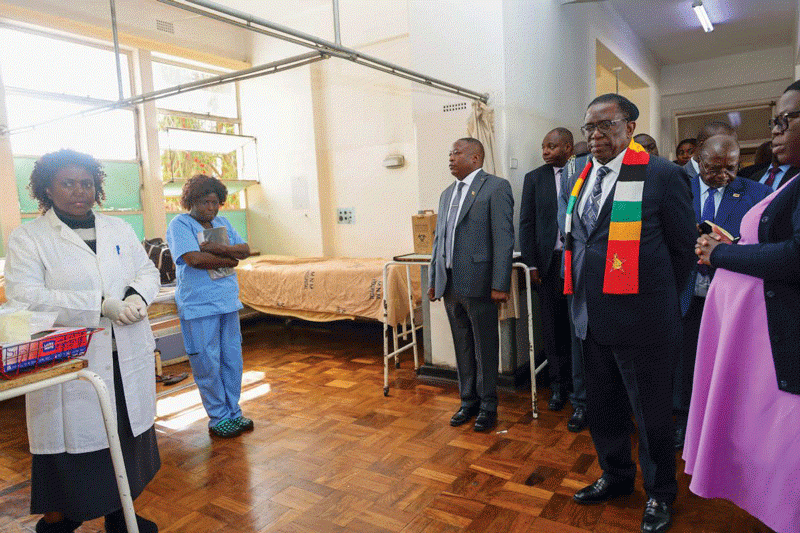
RECENTLY, the Head of State, President Emmerson Mnangagwa, made impromptu visits to two of the country’s largest referral hospitals — Parirenyatwa Group of Hospitals and Sally Mugabe Central Hospital — where he hopefully witnessed, firsthand, the dire conditions within the public health delivery system.
We contend that the problems bedevilling the health sector have made headlines for years, and the pleas of healthcare workers have, unfortunately, been consistently ignored.
Grandstanding visits have come and gone, but there is no sign that the issues the President witnessed are being addressed.
Healthcare workers have long complained about poor remuneration, deplorable working conditions and severe staff shortages.
Job actions have repeatedly shifted between nurses and doctors, yet there is still no light at the end of the tunnel.
In recently leaked letters, distressed nurses indicated that they had tried all available avenues to resolve the crisis amicably, to no avail.
“Due to poor remuneration, poor working conditions and staff shortages, we are unable to perform our duties as nurses,” one letter stated.
“Despite our efforts to resolve this matter amicably, we have not received satisfactory support or resolution,” it continued.
- ED’s influence will take generations to erase
- ‘Govt spineless on wetland land barons’
- Govt under attack over banks lending ban
- Zim Constitution must be amended
Keep Reading
They added: “In line with the country’s labour laws and regulations, we are left with no option but to take industrial action.”
The concerns raised by nurses are not new.
For years, healthcare workers have voiced the same grievances.
Instead of addressing them, government has continued to suppress their demands, despite how legitimate and urgent those concerns are.
From chronic underfunding and dilapidated infrastructure to mass exodus of skilled health professionals seeking better opportunities abroad, the crisis in the health sector has been exposed for far too long.
A lack of political will has led to the collapse of the health delivery system.
This failure to take decisive action against long-standing deficiencies — which have left millions exposed to life-threatening diseases — is deeply concerning and must be urgently addressed.
For years, Harare has relied heavily on donor funding to support the ailing health sector.
With United States President Donald Trump’s signing of an executive order suspending foreign aid earlier this year, Zimbabwe was left in the lurch.
Dependency on foreign assistance has always been a ticking time bomb and the suspension of aid has worsened the crisis.
The nurses have made it clear: They have exhausted all reasonable means to resolve the crisis amicably, yet have met a brick wall at every turn.
Meanwhile, their employer — government — appears disorganised, putting on a brave face as though it is in control.
What the situation does not need is the intimidation of nurses’ association leaders. It does not need threats of dismissal.
Nor does it require the firing of 16 000 striking nurses, as was the case in 2018 when Vice-President Constantino Chiwenga, then also Health and Child Care minister, summarily dismissed all striking nurses before reversing the decision.
What the health crisis desperately needs is political will leading to concrete action.
For years, government has been urged to allocate 15% of the national budget to the health sector, in line with the Abuja Declaration. But it has failed to do so.
Despite introducing a raft of taxes intended to boost health sector funding — such as the recent sugar tax — it continues to fail the accountability test.
When this happens, government loses its ability to effectively use available financial resources to strengthen the sector and protect the most vulnerable.
It is always the poor — those who cannot seek treatment abroad like politicians do — who suffer most.
This is why government must take a genuine and urgent interest in reviving public health services.
The failure by clinics and hospitals to provide quality care is a clear violation of the Constitution, which guarantees the right to health.
Unfortunately, these constitutional provisions remain mere words on paper, but out of reach for the majority who depend on public healthcare.
In response to the worsening situation, the Zimbabwe Association of Doctors for Human Rights (ZADHR) urged the President to go beyond symbolic hospital visits and establish a commission of inquiry into the healthcare sector.
The group argues that a high-level investigation is essential to diagnose systemic failures and ensure meaningful, lasting reform — aligned with the constitutional right to health.
ZADHR maintains that the commission of inquiry should be tasked with examining the state of healthcare service provision by government and its agencies, with a view to improve service delivery in accordance with the obligations set out in the Constitution. Section 76 of the Constitution guarantees every citizen the right to access basic healthcare services — a right that is currently not being enjoyed.
Ultimately, only firm political will, accompanied by structural reforms and full accountability, can rescue Zimbabwe’s collapsing health sector from the current state of neglect.






